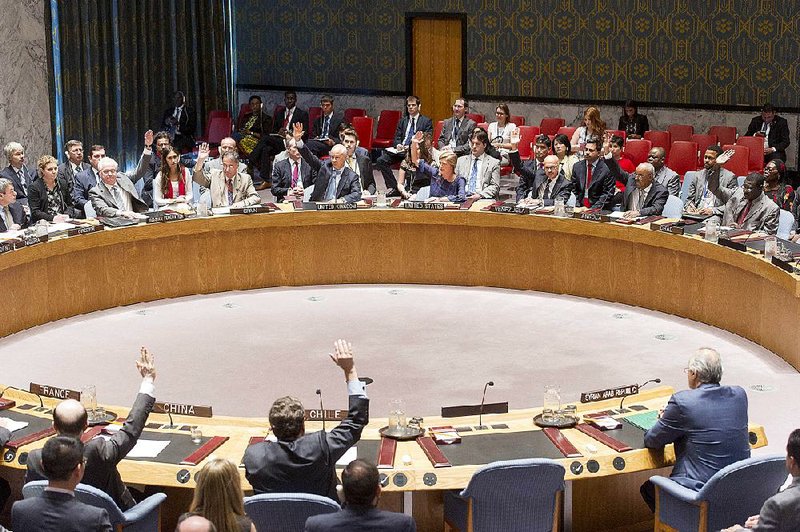BEIRUT -- The Islamic State has abducted 230 residents, including dozens of Christians, from a central Syrian city captured by the extremists the day before, activists said Friday.
The Islamic State extremists overran the heavily populated Qaryatain on Thursday, said the Britain-based Syrian Observatory for Human Rights and Syria-based activist Bebars al-Talawy.
Osama Edward, director of the Christian Assyrian Network for Human Rights in Syria, said about 60 Christians were initially taken but about half of them were released and had made it to nearby villages.
Qaryatain lies in the middle of a triangle formed by the cities of Homs, Palmyra and Damascus. Activists say it has a mixed population of about 40,000 Sunni Muslims and Christians, as well as thousands of internally displaced people who had fled from Homs.
The Observatory said "dozens" of Christians were among the people abducted; al-Talawy put the number at 60. He said the rest of those abducted, about 170 people, are Sunni Muslims.
The Observatory also said 45 women and 19 children were among those abducted. Assyrian Christian priest Gabriel Dawoud told the Lebanon-based Al-Mayadeen TV that two of the abducted Christians were in wheelchairs.
Edward said the Islamic State appears to be preparing to attack the Christian city of Sadad, currently home to more than 4,000 Christian families, that was captured by al-Qaida's fighters in 2013 but was retaken by Syrian troops shortly afterward.
Many of the Sadad townspeople are already fleeing the area, he said.
Amnesty International condemned the abductions. Neil Sammonds, the London-based group's Syria researcher, said the abductions were "abhorrent" and highlighted the "dreadful plight of civilians caught up in the conflict in the country."
"Every effort must be made to identify the perpetrators of these crimes and bring them to justice," Sammonds added.
The Turkey-based Syrian National Coalition, the main Western-backed opposition group, claimed that President Bashar Assad's government facilitated the capture of the religiously mixed Qaryatain "in order to exploit the matter politically."
Christians make up about 10 percent of Syria's prewar population of 23 million.
In February, the Islamic State kidnapped more than 220 Assyrian Christians after overrunning several farming communities on the southern bank of the Khabur River in the northeastern province of Hassakeh.
Since then, only a few have been released, and the fate of the others remains unknown.
In other news, the United Nations Security Council unanimously adopted a resolution Friday aimed at identifying those responsible for using chlorine and other chemical weapons in attacks in Syria that have killed and injured a growing number of civilians over the past two years.
The resolution, negotiated primarily by the United States and Russia, establishes an international investigative body that would assign blame for any chemical weapons attacks during the Syrian conflict, now in its fifth year, so that the perpetrators can be brought to justice.
A chemical-weapon attack on a Damascus suburb on Aug. 21, 2013, killed hundreds of civilians and led the Security Council to demand the destruction of Syria's chemical weapons and the equipment used to produce them. But there have been numerous reports of continuing use of chemicals as weapons in Syria since then, especially chlorine-filled barrel bombs.
The Syrian government denies using chemical weapons, a point reiterated Friday by Syria's U.N. ambassador, Bashar Ja'afari, who blamed "terrorist" groups.
But the United States and other Western nations contend Syria's government is to blame, especially for barrel bombs and other toxic agents dropped by helicopters, since the opposition doesn't have aircraft.
"Pointing a finger matters," U.S. Ambassador Samantha Power told the council. "This sends a clear and powerful message to all those involved in chemical weapons attacks in Syria that the [new investigative body] will identify you if you gas people."
But she added that prosecuting perpetrators will take time because there is still no tribunal to investigate alleged crimes during the war in Syria, which has killed at least 250,000 people since it began in March 2011, according to the U.N.
The Organization for the Prohibition of Chemical Weapons, the global chemical weapons watchdog, has a mandate to carry out fact-finding missions to determine whether chemical attacks occurred in Syria. But neither the organization nor the United Nations has a mandate to determine responsibility.
The resolution asks U.N. Secretary-General Ban Ki-moon, in coordination with organization, to work to establish a joint investigative mechanism that would have the power to identify the perpetrators.
Syria's declared stockpile of 1,300 metric tons of chemicals has been destroyed, but the organization is investigating possible undeclared chemical weapons.
Chlorine is not officially considered a warfare agent and was not among the chemicals declared by Syria, but its use as a weapon is illegal.
Information for this article was contributed by Edith M. Lederer of The Associated Press.
A Section on 08/08/2015

